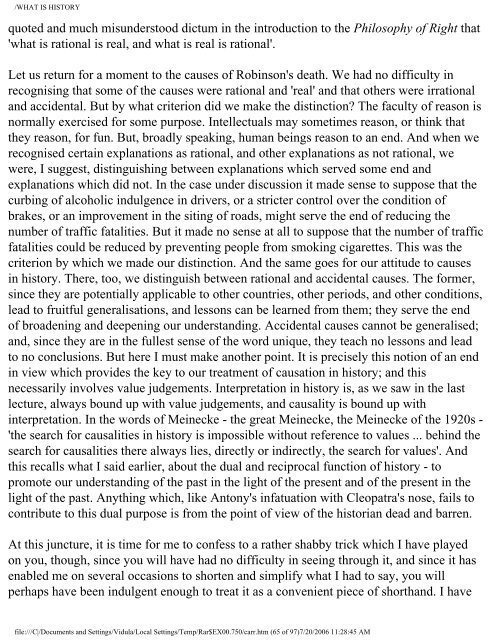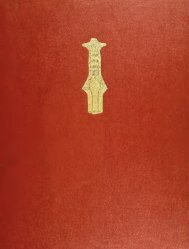What is History / by Edward Hallett Carr - Universal History Library
What is History / by Edward Hallett Carr - Universal History Library
What is History / by Edward Hallett Carr - Universal History Library
You also want an ePaper? Increase the reach of your titles
YUMPU automatically turns print PDFs into web optimized ePapers that Google loves.
WHAT IS HISTORY<br />
quoted and much m<strong>is</strong>understood dictum in the introduction to the Philosophy of Right that<br />
'what <strong>is</strong> rational <strong>is</strong> real, and what <strong>is</strong> real <strong>is</strong> rational'.<br />
Let us return for a moment to the causes of Robinson's death. We had no difficulty in<br />
recogn<strong>is</strong>ing that some of the causes were rational and 'real' and that others were irrational<br />
and accidental. But <strong>by</strong> what criterion did we make the d<strong>is</strong>tinction? The faculty of reason <strong>is</strong><br />
normally exerc<strong>is</strong>ed for some purpose. Intellectuals may sometimes reason, or think that<br />
they reason, for fun. But, broadly speaking, human beings reason to an end. And when we<br />
recogn<strong>is</strong>ed certain explanations as rational, and other explanations as not rational, we<br />
were, I suggest, d<strong>is</strong>tingu<strong>is</strong>hing between explanations which served some end and<br />
explanations which did not. In the case under d<strong>is</strong>cussion it made sense to suppose that the<br />
curbing of alcoholic indulgence in drivers, or a stricter control over the condition of<br />
brakes, or an improvement in the siting of roads, might serve the end of reducing the<br />
number of traffic fatalities. But it made no sense at all to suppose that the number of traffic<br />
fatalities could be reduced <strong>by</strong> preventing people from smoking cigarettes. Th<strong>is</strong> was the<br />
criterion <strong>by</strong> which we made our d<strong>is</strong>tinction. And the same goes for our attitude to causes<br />
in h<strong>is</strong>tory. There, too, we d<strong>is</strong>tingu<strong>is</strong>h between rational and accidental causes. The former,<br />
since they are potentially applicable to other countries, other periods, and other conditions,<br />
lead to fruitful general<strong>is</strong>ations, and lessons can be learned from them; they serve the end<br />
of broadening and deepening our understanding. Accidental causes cannot be general<strong>is</strong>ed;<br />
and, since they are in the fullest sense of the word unique, they teach no lessons and lead<br />
to no conclusions. But here I must make another point. It <strong>is</strong> prec<strong>is</strong>ely th<strong>is</strong> notion of an end<br />
in view which provides the key to our treatment of causation in h<strong>is</strong>tory; and th<strong>is</strong><br />
necessarily involves value judgements. Interpretation in h<strong>is</strong>tory <strong>is</strong>, as we saw in the last<br />
lecture, always bound up with value judgements, and causality <strong>is</strong> bound up with<br />
interpretation. In the words of Meinecke - the great Meinecke, the Meinecke of the 1920s -<br />
'the search for causalities in h<strong>is</strong>tory <strong>is</strong> impossible without reference to values ... behind the<br />
search for causalities there always lies, directly or indirectly, the search for values'. And<br />
th<strong>is</strong> recalls what I said earlier, about the dual and reciprocal function of h<strong>is</strong>tory - to<br />
promote our understanding of the past in the light of the present and of the present in the<br />
light of the past. Anything which, like Antony's infatuation with Cleopatra's nose, fails to<br />
contribute to th<strong>is</strong> dual purpose <strong>is</strong> from the point of view of the h<strong>is</strong>torian dead and barren.<br />
At th<strong>is</strong> juncture, it <strong>is</strong> time for me to confess to a rather shab<strong>by</strong> trick which I have played<br />
on you, though, since you will have had no difficulty in seeing through it, and since it has<br />
enabled me on several occasions to shorten and simplify what I had to say, you will<br />
perhaps have been indulgent enough to treat it as a convenient piece of shorthand. I have<br />
file:///C|/Documents and Settings/Vidula/Local Settings/Temp/Rar$EX00.750/carr.htm (65 of 97)7/20/2006 11:28:45 AM







